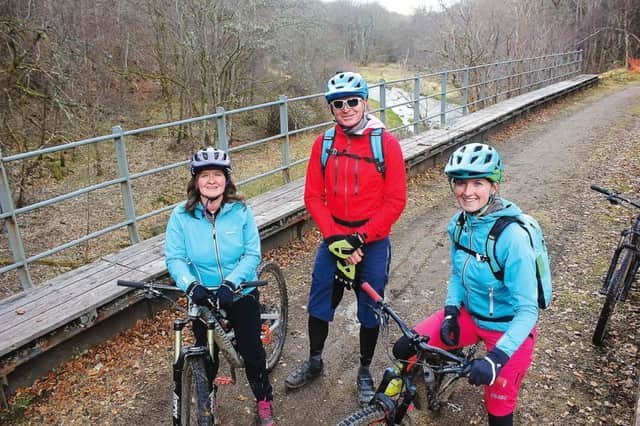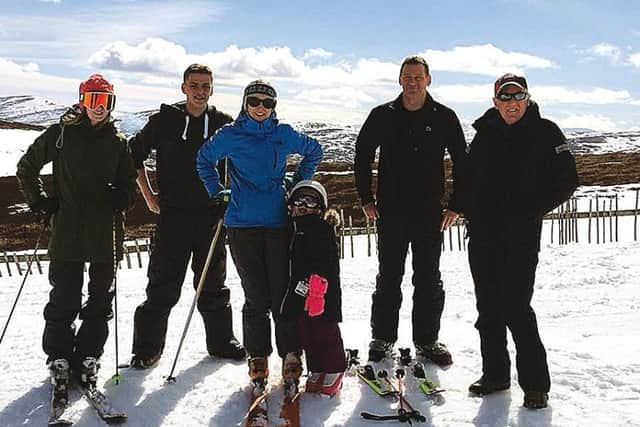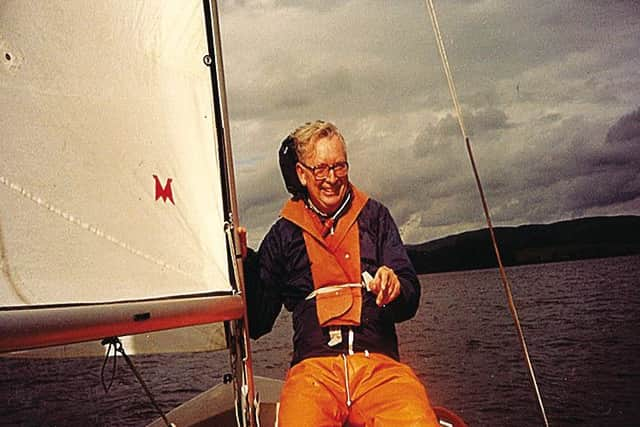Scottish family firms, many of which serve the outdoors industry, are integral to their local communities


His wife, Jenny, joined him in the Mikes Bikes Aviemore venture, with Sally, their teenage daughter, working on a part-time basis. After completing her fifth year at secondary school, Sally committed more time to the enterprise and is now a fully-fledged permanent member of the thriving family business. In the ten years since opening, the shop has doubled in floor size and is busier than ever. The Devlins have also taken on two full-time staff.
Another successful family-run business, of four decades and two generations, is the Lecht Ski Centre in the Cairngorms. The company was started in 1977 by James McIntosh and Pieter du Pon. McIntosh was brought up in the local area and joined the Royal Navy in 1969, where he was part of a naval ski team and met du Pon.
Advertisement
Hide AdAdvertisement
Hide AdMcIntosh was convinced the terrain close to his home in Strathdon would make an ideal spot for a ski centre. The Lecht has since grown from a couple of rope tows and huts to a network of slopes served by no fewer than 13 lifts, as well as the continental-style Day Lodge, snow cannons and a snow factory.


McIntosh is still at the helm with his wife, Alison, running the catering. Son Nicholas is the chief snow groomer, while younger daughter Annette works in the office. Elder daughter Louise and her husband are employed part-time to assist with the finances. Even six-year-old granddaughter Emma gets in on the family act, helping out with the sweeping and mopping. And du Pon’s wife, Marjorie, ran the ski snow shop for years before passing it on to her son.
These are just two examples of the 300,000 family-run businesses in Scotland, as cited in the most recent report, from 2016, produced by Oxford Economics for the Institute for Family Business. Across the UK, two-thirds of all businesses are family-owned and generate more than one quarter of Britain’s GDP.
While there are no official separate figures for the outdoors and adventure sector, tourism as a whole forms a vital part of Scotland’s economy. Scottish Government figures reveal that spending by tourists generates £12 billion of economic activity for the wider Scottish supply chain and contributes £6bn to the nation’s GDP, representing about 5 per cent of the total. The tourism industry in Scotland supported more than 217,000 jobs in 2015, accounting for about 8.5 per cent of the country’s employment.
Paul Andrews, founder and managing director of Family Business United, believes that smaller family firms, such as many of those serving the outdoors sector, are particularly important to local communities.


He says: “Many of these businesses succeed for generations and become part of the very fabric of the communities in which they operate. They build direct economic activity, generate local jobs and community wealth.”
What is also clear is that personal passions are often at the heart of the success of family firms.
Claire Seaman, professor of enterprise and family business at Queen Margaret University (QMU) in Musselburgh, confirms that common pursuits and shared enthusiasms are often the cornerstones of a family business.
Advertisement
Hide AdAdvertisement
Hide AdShe reveals: “Research at the university indicates that family values and interests contribute to both the original decision to start a business and to the on-going development and strategy of that business.”
Sally Devlin, who is a mountain bike guide and coach, agrees that her family share a common interest. She says: “We are all committed bikers. We have been involved in the cycling community for most of our lives. We are also open-minded and as happy to serve hardcore racers at Mikes Bikes as we are novices and leisure cyclists.”
She also believes that success comes from having a common goal and compatibility, saying: “We all want to make the business a success, as a whole and for each other. After all, the whole family relies on the income.
“Plus, fortunately, as a family we get on well together. This is lucky because we spend a lot of time at work and in our leisure time together.”
Annette McIntosh, who as well as taking care of general administration at The Lecht also sells lift passes, believes that the very fact that the business is family-run means everyone is committed to making it a success.
She says: “Even though everyone has their own role, we all help out across the business where necessary. We do not have a set management structure and we’ve even had James and Pieter washing the dishes. It’s always been like this, everyone puts in so much hard work behind the scenes.”
Family businesses are not of course without their challenges and difficulties. There can be weaknesses, such as a lack of objectivity, spending too much time together, petty squabbles and having all the family’s financial eggs in one basket.
QMU’s Professor Seaman notes that for success, these types of businesses need to create structures which offer a degree of separation between, for example, family discussion and business discussion.
Advertisement
Hide AdAdvertisement
Hide AdShe underlines: “This is especially important as the business grows and develops to include two or more generations. Similarly, financial planning and robust advice are vital for many people – and families in business are no exception.”
At another family-run outdoors business, Galloway Activity Centre (GAC), in south-west Scotland, Richard Hermon reveals how he has changed his management style over the years to better suit the company.
The centre on Loch Ken was started by Hermon’s father, Roddy, in 1988. Seven years later, when his wife passed away, Roddy handed the reins to Richard and his wife, Heather. One of their children, Lucy, now also works in the business.
Hermon says: “We have expanded the activity centre and also started an ‘eco-bothies’ business. We have 42 seasonal staff, eight of whom are full-time, so it’s quite large.
“Prior to running the centre, I was in the army and I was used to instructing people on what to do and expected them to jump into action. My approach as director at GAC is very different – it’s based much more on discussion with others.
“For example, we always discuss the big decisions with the management team and include their ideas in our strategies. Then, I will sit down with either Heather, if it’s the GAC business, or Lucy, if it’s the bothies, for final planning. This is a much more inclusive approach, ensuring other people in the business are engaged, and this approach has worked very well for a successful business.”
Sally Devlin does admit to finding that working in a family business is “pretty intense”.
She explains: “We work on the shop floor together most days and enjoy each other’s company out of work as well. In fact, I only moved out of the family home last year. We do spend a lot of our time talking shop and looking at the future and we find it hard to switch off.
Advertisement
Hide AdAdvertisement
Hide Ad“I guess it’s the same for other family businesses. It’s good in some ways and tricky in others, but we all want the same thing, to be a successful and reputable business.”
This article appeared in the spring 2019 edition of Vision. A digital version can be viewed here.